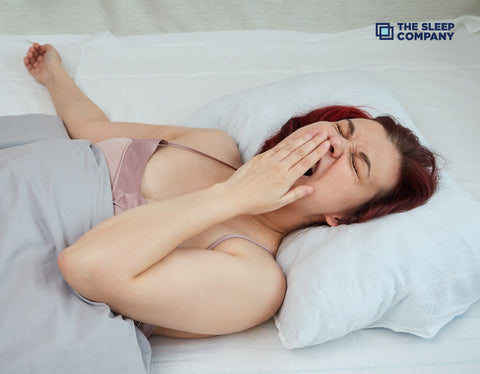My Cart

Coping with Fatigue and Sleepiness in Cancer Patients

Fatigue and sleepiness are common side effects that cancer patients face during treatment. Infact, research suggests that it affects almost 65 out of 100 people with cancer.
These symptoms can be caused by the illness itself, but chemotherapy and other medications can also be the reason. They cause this overwhelming exhaustion that can affect your daily life.
However, you must cope with this extreme fatigue and sleepiness not just to manage your physical health, but also to take care of your overall emotional and mental well-being.
There are easy tips you can incorporate into your routine that can help make a difference. Ahead, we will tell you more about it.
What Is Cancer Fatigue?
Cancer fatigue is severe tiredness that does not go away even after you rest. It is not something one would normally experience. With cancer fatigue, it becomes excessively difficult to get out of bed and even perform the simplest of chores with focus. It is caused by the disease and treatments like chemotherapy or radiation. Other factors like stress, lack of sleep, or poor nutrition also come into play.
Cancer fatigue can last for a long time and can get overwhelming. Therefore, it is important to come up with proper strategies and lifestyle changes that work for you. Combating this condition early on can help you with your emotional and mental health.
What Causes Cancer Fatigue and Sleepiness in Cancer Patients?

Here are a few reasons why one experiences cancer fatigue.
1. Treatment
Cancer treatments, such as chemotherapy, radiation, and even surgery can drain your energy. Also, some treatments lower the red blood cells and reduce oxygen flow. This can make you feel severely tired and can take time to help you recover.
2. Fighting The Disease
Your body makes use of extra energy to fight the disease. This goes on until you get better. Hence, it can lead to extreme exhaustion.
3. Medication
Pain relievers, anti-nausea drugs, and other medications that you are required to take during the course of your treatment can make you feel sleepy.
4. Emotions and Mental Health
Anxiety, depression, and worry about cancer can lead to fatigue. Some may also experience insomnia or disrupted sleep that can worsen fatigue.
Top 10 Tips to Cope with Fatigue and Sleepiness in Cancer Patients

Here are a few tips to incorporate to cope with fatigue and sleepiness in cancer patients.
1. Proper Rest
2. Practice Gentle Exercises
3. Take Care of Mental Health
4. Have A Balanced Meal
5. Don’t Drink Too Much Caffeine
6. Stay Connected To Your Loved Ones
7. Partake In Hobbies
8. Try To Focus On The Now
9. Drink Plenty Of Fluids
10. Make A Note Of Your Symptoms
1. Proper Rest
According to experts, it is seen that improved sleep quality can relieve cancer-related symptoms including fatigue, pain, and mood disturbance.
That's why proper rest is essential to restore any lost energy. Every night, make sure you are getting a consistent sleep of at least 8-9 hours. To help you out, go to bed and wake up at the same time every day. Short napscan also be ideal. However, make sure each nap session doesn't exceed 30 minutes. This way, it won't interfere with your nighttime sleep.
You can also create a comfortable sleep environment to help your child out. From getting a cozy mattress that meets your needs to plush bedding, it can help your child rest better.
Another trick is to include a calming bedtime routine, such as listening to soft music or reading. It can help you relax and improve sleep quality. Proper sleep can help you feel more rested and energized.
2. Practice Gentle Exercises
It is seen that gentle exercise can be extremely beneficial in cancer patients.
Infact, it can bring forth a variety of benefits, which include:
- Reduction in anxiety and depression
- Reduction in fatigue and sleepiness
- Increase in quality of life during and after cancer treatment
- Can prevent or improve lymphedema
You can practice gentle exercises, like walking, yoga, or stretching. They can help improve circulation and reduce fatigue over time. Make sure you start slowly and gradually increase your intensity with time.
However, speak with your healthcare provider so they can guide you in the right direction as per your condition. But listen to your body and rest when needed.
3. Take Care of Mental Health
Cancer not only drains you physically but can also impact you emotionally. When you neglect your mental health, it leads to fatigue and other issues, such as anxiety, depression, and stress. One simple way to feel energized is to work on your mental health.
Consider talking to a therapist or counselor to process your feelings. It's always the best course of action because they can guide you in the right direction.
For instance, some people find mindfulness techniques like deep breathing, meditation, or progressive muscle relaxation a great way to calm the mind and ease emotional fatigue. Support groups, whether online or in-person, can also provide comfort and connection. See what works for you.
4. Have A Balanced Meal
To help combat sleepiness and fatigue, food plays an important role. Make sure you consume a balanced meal and lean more on nutrient-dense food like fruits and vegetables.
If you are struggling with nausea, try eating small and frequent meals.
You can also speak with your doctor as well if you are struggling with severe nausea symptoms. Remember, food is important as it gives you the energy you need.
5. Don’t Drink Too Much Caffeine
A cup of coffee or chai can seem like a perfect solution when it comes to coping with fatigue and sleepiness. However, they don't really do much.
So, what happens is that when you have a cup of coffee, you experience a temporary surge in your energy levels. But then, you end up feeling more tired than ever.
Instead, limit your coffee or chai intake and switch to herbal teas.
6. Stay Connected To Your Loved Ones
You need all the support you can get. Don't isolate yourself at this time. Stay connected to your friends and family. They can offer you the emotional support you need, which can help curb fatigue levels.
Socializing, even in small amounts, can lift your mood and distract you from feelings of tiredness. A simple phone call or video chat with a loved one can make a world of difference.
7. Partake In Hobbies
Don't let only worries and anxiety keep you company. Instead, try activities or hobbies you may enjoy.
Whether it's reading, painting, knitting, or listening to music, small moments of joy can lift your spirits and reduce mental exhaustion.
However, make sure that your hobbies don't strain you too much and can offer a sense of pleasure that makes you feel good.
8. Try to Focus on the Now
We understand it is easier said than done. However, mindfulness can be of great help in combating cancer fatigue and sleepiness.
Mindfulness techniques help keep your focus on the now and reduce any lingering stress or worry. It can also improve sleep quality, decrease anxiety, and help manage the emotional toll of cancer treatment.
You can start with a few minutes of deep breathing or focusing on positive thoughts. In no time, you will see a noticeable difference in how you feel.
9. Drink Plenty Of Fluids
Dehydration is a common side effect of cancer treatment and it can also affect your mood.
So, it is important to drink plenty of water throughout the day as it helps maintain your energy levels. If plain water doesn’t suit your taste, try flavored water or herbal tea to help you maintain your hydration levels.
10. Make a Note of Your Symptoms
When you are dealing with cancer, it becomes crucial to keep an eye on your symptoms as there is never any single solution for everyone.
So, make sure you maintain a journal to track your tiredness levels, sleep patterns, and more.
You can keep one on your phone or a physical notebook. This can help you identify what works best for you. Share this information with your doctor as well so they can guide you in the right direction.
Wrapping Up
We understand that battling this ailment while coping with fatigue and sleepiness can be challenging. However, it is not impossible. From the above list, see which tip can work well for you. With trial and error, you can build a proper routine that helps keep energy levels stable.
Also, make sure you get the rest you deserve. If necessary, create a plush sleep environment that offers you the level of comfort you need. From a supportive mattress to pillows and beddings, see what can help improve the quality of your rest.
Every patient’s journey is unique, so it’s important to find what works best for you.
FAQs
When it comes to managing cancer fatigue, a few things you can try include getting proper rest, staying hydrated, eating a balanced diet, and engaging in light exercise. Also, don't hesitate to speak with your healthcare provider as they will be able to guide you in the right direction.
Cancer fatigue feels like extreme and severe tiredness that just doesn’t seem to go away with rest. It can make everyday tasks feel overwhelming, and you may also experience mental fog, weakness, and an overall lack of energy that makes it difficult to get out of bed.
Cancer-related fatigue can last throughout treatment and sometimes for months or even years after treatment ends. This can differ from one patient to another, and the type of cancer.
Cancer and its treatments, such as chemotherapy and radiation, can drain the body’s energy. This leads to extreme tiredness, and sleep helps you cope with it.




























































